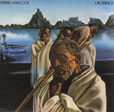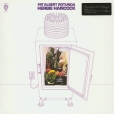Your basket is empty

Herbie Hancock
Mwandishi
Warners / Music On Vinyl
‘After releasing their Warner Bros. debut, the Herbie Hancock Sextet underwent a major transformation in the early ’70s. Over the course of a year, every member was replaced (except Herbie Hancock himself and bassist Buster Williams) and each adopted Swahili names. Hancock chose the moniker Mwandishi (‘composer’), and the Sextet became unofficially known as the Mwandishi Band.
‘The lineup’s first album reflects Hancock’s new aesthetic and spiritual directions. Stretching out from the r&b/jazz-fusion of Fat Albert Rotunda, the pianist would draw inspiration from his time with Miles Davis…
‘Dedicated to Angela Davis, Ostinato is an extended jam with stunning rhythmic complexity — enhanced by such studio effects as Echoplex delay. On You’ll Know When You Get There, Hancock’s tight arrangements are saturated in reverb, which gives an ever-shifting dimensionality. Side-long closer Wandering Spirit Song, written by trombonist Julian Priester, goes even further out: alternating between dynamic soloing and group improvisation, the Sextet fully manifests the radical potential of their collective identity/energy.
‘A bold and expansive statement, even after nearly fifty years.’
‘Herbie took the basic instrumental tracks of Quasar and Water Torture to Patrick
Gleeson’s Different Fur Studios, hoping to learn how to play the Moog synthesizer. Instead, Hancock let Gleeson contribute layers of sound to both pieces: on Quasar extending the horn playing of Bennie Maupin, Julian Priester and Eddie Henderson through electronic accents; on Water Torture providing a ghostly counter melody on the Mellotron (using samples from string instruments). These studio enhancements give Crossings an
otherworldly dimension, making the album feel bigger and more fantastical, yet the Sextet’s playing — recorded without much in way of edits or overdubs — keeps everything grounded. Indeed, Gleason’s additions are often so natural that it is hard to pick out what’s acoustic and what’s synthesized.’
The second LP by the sextet aka the Mwandishi Band, and Herbie’s last for Warner Brothers, clearing the way for the Headunters.
LP from Music On Vinyl.
‘A playful, joyous album in which Hancock clearly had a great time, this music was composed for the pilot of a children’s TV show, redirecting the post-bop of his five-year stint with Miles towards new r&b and funk styles. Flying high with three horn players — Joe Henderson, Garrett Brown and Johnny Coles — alongside Hancock’s soaring Fender Rhodes, the group could swing freely on a track like the rousing Fat Mama and emote precisely on the subtle Tell Me A Bedtime Story.’



